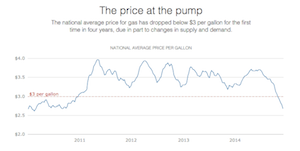Saudi Arabia and the United Arab Emirates reiterated pledges to keep pumping the same amount of crude, blaming non-OPEC producers for the glut of oil that's driven prices to the lowest point in five years.
Suppliers from outside the Organization of Petroleum Exporting Countries should cut "irresponsible" output, U.A.E. Energy Minister Suhail Al Mazrouei said Sunday in Abu Dhabi. Even if non-OPEC producers were to offer cuts, OPEC probably wouldn't follow suit, Saudi Oil Minister Ali Al-Naimi said. The two countries account for about 40 percent of OPEC supply.
Oil prices fell about 20 percent since OPEC chose to maintain its production target at a Nov. 27 meeting, seeking to defend market share rather than prices. The highest U.S. crude output in at least three decades is contributing to a glut that Qatar estimates at 2 million barrels a day. Saudi Arabia is confident prices will rebound as economic growth drives up demand and "inefficient producers" trim output, Al-Naimi said.
"OPEC's recent decision to leave production targets unchanged now places greater pressure on non-OPEC output to rebalance an oversupplied market," analysts from ANZ Banking Group Ltd. including Melbourne-based Mark Pervan wrote in an emailed report. "Expanded production by all OPEC members next year would likely cause sharper falls in prices."
OPEC produced more than its 30 million-barrel daily target in each of the past six months, data compiled by Bloomberg show. Non-OPEC production will expand 2.3 percent next year to 57.84 million barrels a day after climbing 3.5 percent this year, the International Energy Agency forecast in a Dec. 12 report.
"Irresponsible production from outside OPEC is behind the fall in prices," Mazrouei said. "We call on all other producers to stop the increase."
Brent crude for February settlement dropped $1.27, or 2.1 percent, to $60.11 a barrel Monday on the London-based ICE Futures Europe exchange. West Texas Intermediate crude for February delivery fell $1.87, or 3.3 percent, to $55.26 on the New York Mercantile Exchange.
Regular grade gasoline at the pump in the United States has dropped for 88 days in a row, the longest stretch of losses on record.
Retail gasoline has fallen every day since Sept. 25 for a total of 95 cents, data from the Heathrow, Fla.-based AAA, the nation's biggest motoring group, showed. The data series begins Jan. 1, 2000. The prior record stretch was 86 days during the recession when prices tumbled $2.20 a gallon, AAA said by email. In Arkansas, the average price Monday was $2.25, down from $2.39 a week ago.
The national average pump price has slipped 1.5 cents to $2.394, the lowest level since May 2009. By New Year's Day, gasoline may be selling for $2.25 to $2.40, the lowest seasonally since 2008, AAA said Dec. 18.
The average U.S. household will save about $550 on gasoline expenses next year, with average fuel spending on track to fall to the lowest level in 11 years, the Energy Information Administration said.
Crude tumbled into a bear market this year as oil extraction soared at shale formations in Texas and North Dakota as companies split rocks using high-pressure liquid, a process known as hydraulic fracturing, or fracking. The increase in demand was also less than expected, at about 700,000 barrels a day instead of the 1.2 million barrels projected, Al-Naimi said.
"The oil market will recover," he said. "Fossil fuel will remain the main source of energy for decades to come."
OPEC doesn't intend to cut its output "whatever the price is," Al-Naimi said in an interview with the Middle East Economic Survey.
Saudi Arabia has 265 billion barrels of oil reserves, and will increase refining capacity to 3.3 million barrels a day by 2017 from 2.1 million barrels in 2014, Al-Naimi said. It's also looking to more joint ventures in downstream projects abroad.
The nation wants to become an international hub for climate change and carbon emissions research, he said. Al-Naimi attended United Nations global warming talks in Lima, Peru, this month.
Information for this article was contributed by Inal Ersan and Joe Carroll of Bloomberg News.
Business on 12/23/2014
